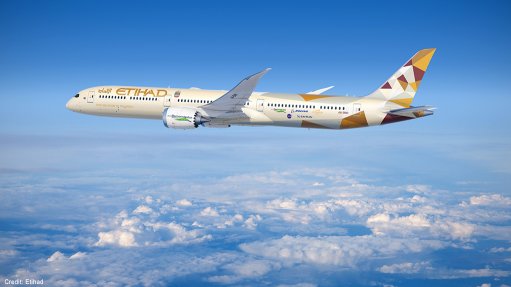
Etihad’s Boeing 787-10 airliner being employed for the tests.
Photo by: Etihad
Abu Dhabi airline Etihad Airways announced on Wednesday that one of its Boeing 787-10 Dreamliner aircraft was participating in the US ecoDemonstrator programme. This programme is a collaboration between the US National Aeronautics and Space Administration (Nasa), Boeing, and French aerospace group Safran.
“Etihad participating in this year’s ecoDemonstrator programme builds on our core innovation and sustainability tenets while supporting the research and development of our partners to bring innovation from the laboratory to a real world testing environment,” explained Etihad Aviation Group COO Mohammad Al Bulooki. “By choosing to take part in this programme we are proud to work with the likes of Boeing, Nasa and Safran to test cutting-edge technologies and explore ‘blue sky’ opportunities to improve airspace efficiency, reduce fuel use, lower noise for the community and cut CO2 emissions.”
This is the first time that the ecoDemonstrator programme, launched in 2012, has used a 787-10. The flight test programme will run for about ten days and is being conducted from Boeing’s flight test facility at Glasgow in the US state of Montana. The airliner being used is newly built and will be delivered to Etihad for commercial operations late next month.
Microphones have been fitted to the aircraft’s exterior and placed on the ground – in all, they total about 1 200. These will allow the collection of the most detailed data so far regarding aircraft noise. In turn, this data will allow Nasa to improve its capability to predict aircraft noise, as well as feed into the design of future quieter aircraft and help develop methods for pilots to reduce noise.
“At Nasa, we’ve been researching the individual airplane noise sources, their interactions with the airframe and how they combine to the total aircraft noise,” reported Nasa technical lead Dr Russell Thomas. “This unique, carefully designed flight test provides the environment where all these effects are measured, which will be key to advancing our ability to design lower-noise aircraft.”
Most public complaints about aircraft noise concern aeroplanes coming in to land. About 25% of this noise is generated by the landing gear. Safran Landing Systems has modified a set of landing gear to produce less noise and this will be tested in another project.
Further, all the scheduled test flights will be flown using a fuel blend with up to 50% sustainable biofuel. And two of the test flights will see the pilots, air traffic controllers and the airline operations centre digitally and simultaneously share information and make use of Nasa’s ‘tailored arrival management’ system. The result should be reduced flight crew work load and radio frequency congestion (thereby increasing safety) while also permitting routing efficiency optimisation, reduced fuel burn, fewer emissions and less noise. The results of these tests will assist the US Federal Aviation Administration’s Next Generation Air Transportation System programme.
Moreover, a handheld ultraviolet light-emitting wand device will be tested for its effectiveness in disinfecting flight decks and airliner cabins. This is part of Boeing’s anti-Covid-19 Confident Travel Initiative.
“Sustainability remains a priority for Etihad in spite of the current Covid-19 crisis and this is just one initiative we’ve taken since the start of the pandemic to continue our drive for sustainable aviation,” stressed Al Bulooki. “As far as Etihad is concerned, environmental sustainability shouldn’t be an option or fair-weather project to be shelved when it’s not convenient against other challenges.”